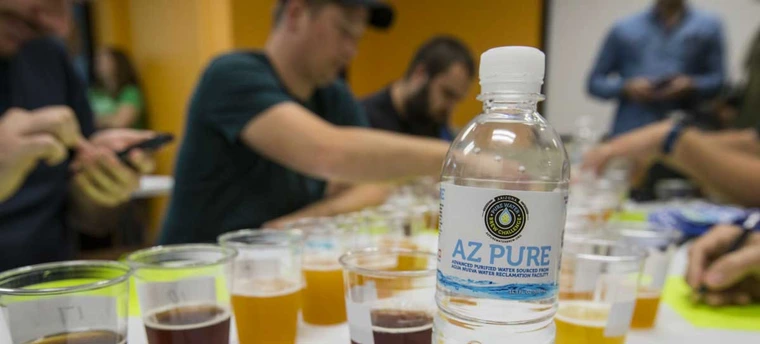
AZ Pure Water Brew Challenge. Photo: Pima County.
by Sam Potteiger, WRRC Student Research Assistant
In the Southwest, where water scarcity is an issue, water reclamation has been adopted as an important conservation strategy. Most of the water used at the Palo Verde Nuclear Generating Station near Tonopah is recycled wastewater from Phoenix. The plant is responsible for supplying power to residents throughout New Mexico, Texas, California, and Arizona. The Desert Mountain Club in Scottsdale uses reclaimed water to irrigate its 550 acres of turf, which accommodate 150,000 rounds of golf each year. The club uses one billion gallons of treated wastewater each year, making it the largest user of reclaimed water in the metro Phoenix-Scottsdale area. In Pima County, reclaimed water is used mainly for irrigating parks and outdoor landscaping. According to its website, the City of Tucson serves reclaimed water to 50 parks, 18 golf courses, and more than 700 single-family households.
The resistance to and acceptance of reclaimed water use by citizens has important implications for utilizing recycled water as a resource. A 2015 study published in the journal Judgment and Decision Making analyzed the attitudes of respondents to the use of potable recycled water in five different metropolitan areas--three in water-scarce regions. Nearly 50 percent of respondents stated that they would be willing to drink recycled water; however, the other 50 percent of respondents were not as confident. They responded that they might try it or would not try it at all. Across the five metropolitan areas, people were more receptive to the use of recycled water for purposes other than drinking. Although there exists a population who support the use of recycled water, a significant number of people still oppose it.
Investigators have tried to identify the cause of public uneasiness regarding potable recycled water, as well as what motivates people to use it. One factor, awareness of water scarcity, appears to affect people’s attitudes. The year 2016 saw one of the worst droughts California has experienced. A poll conducted in California that year by water technology firm Xylem found that 89 percent of respondents agreed that the threat of drought had made them more supportive of recycled water use.
Another major factor is level of relevant knowledge and awareness. A 2011 study in Water Resources concluded that knowledge about water sources, including reclaimed water, was linked with positive perceptions and the likelihood that the water would be used. In the Xylem poll, 89 percent of respondents were more willing to use recycled water for general purposes after they heard about the treatment process. The results from these studies send a clear message to proponents of recycled water about the importance of outreach and education to securing public support. This past summer, Arizona Pure Water Brew set out to inform and engage the public about recycling water for potable use.
Arizona Pure Water Brew was a statewide campaign to inform Arizonans about water issues, water reuse, and the water purification technology. In August 2017, the campaign challenged brewers with a competition for the best beer brewed using purified wastewater. Twenty-six brewers took up the challenge.
To reach Arizonans, all of the water treatment equipment was contained in a truck that traveled around the state and supplied brewers with purified water created by treating local wastewater. The side of the truck could be opened to demonstrate the purification system inside. Purification involved a five step process, which resulted in treated wastewater that was purer than water from the tap. The purified water was then distributed to the competing brewers at each location.
The brews were indistinguishable from brews using regular non-recycled water. In a blind taste test, panelists were not able to discern a difference in taste. In addition, brewers found the recycled water easier to use because they did not have to remove any minerals in order to make the water suitable for brewing. The winners were announced at the 32nd Annual WateReuse Symposium in Phoenix in September. The Arizona Pure Water Brew project was all about conservation and education. They wanted to take their point to the people, and what’s more relatable than beer? Their outreach effort was especially timely, as it coincided with deliberations leading to changes in Arizona’s recycled water regulations.
The Arizona Department of Environmental Quality (ADEQ) is the agency charged with the regulation of recycled water. Under past regulation, reclaimed water could not be permitted for human consumption. It was mainly used for irrigation. Under modifications made effective January 1, 2018, this restriction was removed. However, in order for wastewater to be used for potable water purposes it would have to undergo further treatment at a specified “advanced water treatment facility”. The advanced water treatment facility would be permitted only after demonstrating that it could meet stringent standards. According to ADEQ, a permitted facility would be capable of removing 99.99999999 percent of all viral contaminants. For comparison, under the Safe Drinking Water Act, surface water sources must remove 99.99 percent of all viruses. Thus, under the regulatory modification, potable water from a reclaimed source would have to be orders of magnitude cleaner than any existing surface water source.
The use of reclaimed water can be expected to expand as growth and other factors increase the demands on existing water supplies. Purified wastewater will be used by some communities to augment their potable supplies. With proper oversight, water reclamation can be an effective solution to water scarcity issues in Arizona and throughout the Southwest.

